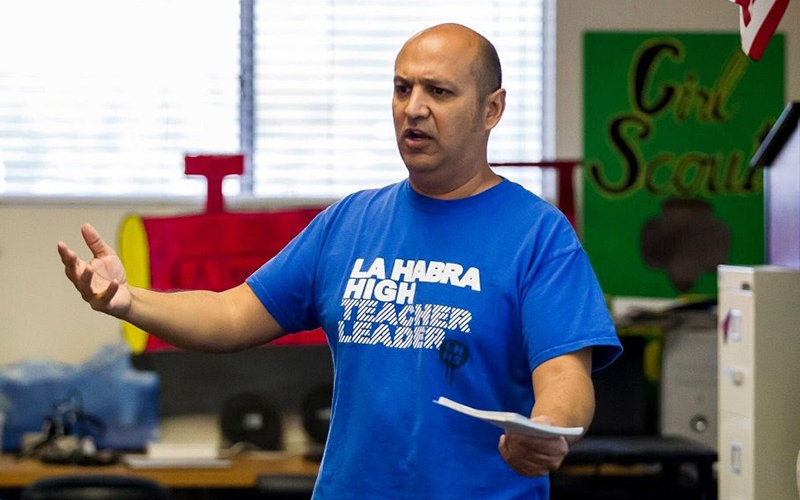
High school history teacher and Cal State Fullerton education graduate student Raymond Lopez has been teaching in the classroom for 26 years. Now, he’s teaching 11th grade students U.S. history — online.
Lopez teaches at La Habra High School, and last week, the school district closed campuses and turned to distance learning, at least through May 1, due to the new coronavirus pandemic.
“For me, the most important part of online learning is for my students to feel supported and safe,” said Lopez, a student in the university’s fully online master’s program in educational technology. The 16-month program prepares educators to promote effective technology integration in learning environments.
“I just don’t believe students are going to learn if they don’t feel safe, and right now, many of our students are scared and stressed,” he added. “But just as all of my professors in the program have shown me support during these difficult weeks, I have done the same with my students.”
While it’s spring break this week, Lopez continues to make himself available to his students.
“My purpose thus far has been to let students voice themselves over a wide range of questions. We are interacting daily with their posts and my responses,” he said.
When school starts back up next week, he plans to hold virtual office hours and move students into collaborative assignments.
Lopez enrolled in the master’s program because he wanted to learn more about the research behind the use of technology, as well as strategies for student-centered learning. He credits the program’s faculty members — Loretta Donovan, Stephanie Campbell and Tim Green — for their support and guidance as he was thrust into online teaching.
“Using what I have learned in this program about distance learning has been invaluable; there was a small part of me that got me excited about the prospect of teaching online. Don’t get me wrong, I would much rather be in the classroom with my students, but when the discussions about online learning began, I was super confident in my abilities because of my master’s work so far,” he relayed.
“I was certainly ahead of the game because I knew how to help my students adjust to online learning and could also understand where students might struggle.”
Lopez added that his CSUF professors were instrumental in helping him and his school on how to move forward with its distance learning program.
“They were able to help us devise a plan and offered feedback during a very stressful time and also helped us get moving in the right direction. They were great examples of a ‘family first’ approach to what we were going through. They recognized that this was a huge adjustment for teachers and wanted to make sure we were OK first before tackling our next assignments. I can’t thank them enough.”
Lopez also has found camaraderie among his peers in the master’s program, who have leaned on each other when schools are closing and classes are going virtual. He’s also put into practice ways to support students.
“Teachers need to find a way for students to express themselves on a regular, if not on a daily basis, and allow others to see their posts and respond,” he said. “I think it’s important for students to have a voice during these difficult times, and to recognize that many of their classmates are feeling the exact same way.”
Debra Cano Ramos, writer, is looking for stories from our campus community about being a witness to history. Contact her at dcanoramos@fullerton.edu